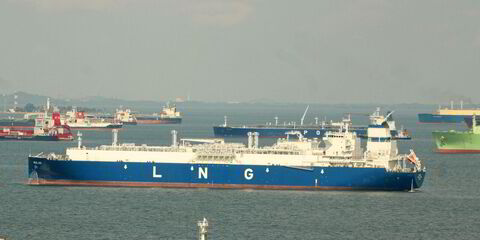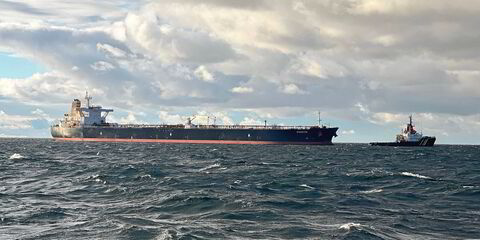Corruption, bribery, fraud, a Russian conspiracy: forget the protestations of the losing England World Cup 2018 bidding team, the Sovcomflot trial had all the allegations first.
The mammoth trial into alleged misdeeds involving former executives and associates of the Moscow-based shipping giant saw some very weighty matters aired, with about $800m riding on the result.
But through the six months of almost continuous questioning, witness after witness along with many guardians of the law provided proceedings with some colourful, controversial and sometimes downright hilarious prose.
TradeWinds takes a look at some of the more entertaining quotations from the so-called shipping trial of the century.
Frankly speaking: Sergey Frank, president & CEO, Sovcomflot.
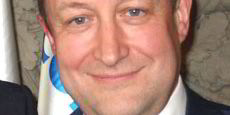
Sovcomflot’s boss Sergey Frank led from the front in the Russian owner’s efforts to take former executives and associates to task for alleged past misdemeanours as he took to the stand early in the trial.
The former transport minister showed his political credentials while appearing mostly calm under fire in the dock and proved willing to dish out harsh truths about friends and foes in equal measure.
“I was not particularly enthusiastic about his appointment.”
Frank let it be known that, during his time at the helm of the transport ministry, he was hardly the biggest fan of Dmitry Skarga. (5 October 2009)
“Only a court can decide who is guilty and no court has found me guilty.”
The current Sovcomflot chief even tempted fate when quizzed on having previously faced corruption allegations. (5 October 2009)
“I was of the view that, during Skarga’s reign, Borisenko was weak and naive rather than fundamentally dishonest.”
Frank was cruel only to be kind to Igor Borisenko, the former boss of Sovcomflot’s UK operation and now a key ally in the fight against Skarga and Nikitin. (7 October 2009)
“This is insulting. Fifty percent of my blood is German.”
Sergey Frank reacts angrily to a remark made by primary defendant Yuri Nikitin in a witness statement that he was ‘worse than the Gestapo’. (8 October 2009)
Nikitin’s patch: Russian shipowner Yuri Nikitin.
If Yuri Nikitin was supposed to be worried by the proceedings largely being brought against him and co-defendant Dmitry Skarga, he certainly didn’t show it.
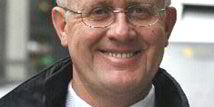
The wealthy private Russian shipowner and oil trader in the main exuded an air of confidence and authority when listening to testimony, but was a little less assured when he was himself put under the microscope.
“Privalov said, on more than one occasion, that Frank was ‘worse than the Gestapo’.”
Written evidence from Nikitin pins the blame for the ‘Gestapo’ jibe on disgraced former Sovcomflot man Yuri Privalov. (8 October 2009)
Nikitin:“We have what we have in the fridge, sometimes he buys some things.”
Sovcomflot barrister Andrew Poppelwell QC:“Sometimes he pays for shopping, does he?”
Nikitin:“I’m not keeping on eye on my fridge.”
Nikitin liked having Skarga around the house: his Russian ‘roomie’ always showed such willingness to chip in with the grocery shopping. (17 November 2009)
Popplewell:“You knew perfectly well that Mr Skarga still had a credit card that was being debited, didn’t you?”
Nikitin:“My curiosity was more aimed on my wife’s statement ... where she’s spending money.”
Forget what bills Skarga may have been running up at Club Golden Dolls in St Petersburg, Nikitin was more concerned with keeping an eye on his high-maintenance wife. (23 November 2009)
Jet Set Russian: Dmitry Skarga, former director general, Sovcomflot.
Like Nikitin, Dmitry Skarga chose to attend the majority of hearings, the pair often arriving at the London court together and in apparent jovial mood.
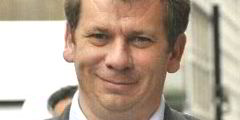
The former Sovcomflot director general appeared well prepared for any dirt thrown his way and even provided some of the most light-hearted moments of the trial, displaying a keen sense of wit when his back was up against the wall.
“I’m pleasing my wife in a slightly different way.”
In possibly the best rejoinder of the trial, Skarga gives Popplewell a dressing down after being hit with allegations that Nikitin laid the foundations for his wife’s new home. (25 February 2010)
“Since 1996 I was on a private jet so many times it is now not possible to remember if I was onboard on this occasion.”
At times Skarga risked accusations of being out of touch with the common man, like when discussing family holidays with Nikitin & Co. (2 December 2009)
“I kept them for my memory, for my recollections. I left Sovcomflot and I went under threats and hostile attacks.”
Skarga was just so fond of some of the literature in his office that he took it with him when he left Sovcomflot¿just for keepsakes, don’t you know. (1 December 2009)
“I felt if I could do something to help save his life I should. He was a nervous wreck, probably close to suicide.”
Dmitry ‘The Samaritan’ Skarga was always on hand to help out Yuri Privalov, the former head of Sovcomflot’s London company, Fiona Maritime, to whom he allegedly gave favourable employment terms. (30 November 2009)
Judge of character: Justice Andrew Smith.
High Court judges are often portrayed as dour figures. Not Justice Andrew Smith.
The silver-haired judge mixed an acute attention to detail with healthy doses of realism, joviality and at time self-deprecation to maintain the trust and respect of all those put before him.
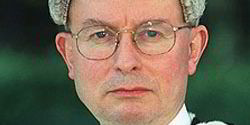
Although willing to be taught a few shipping lessons from experts along the way, Smith was no shrinking violet whenever he suspected his authority may have been questioned, as some found out to the peril.
“Have you got any complaint against me stopping you doing anything, Mr Popplewell, or not?”
Justice Smith was always favourite to pick up the ‘Rebuke of the Trial’ award and promptly delivered when he got shirty with Popplewell over perceived badgering of former Novoship chief Tagir Izmaylov. (14 December 2009)
“Thank you, I hope you enjoy your leisure.”
With a tinge of impish humour, Justice Smith sends all parties off with a smile in his closing address before delivering his judgment some nine months later. (31 March 2010)
Popplewell appeal: Andrew Popplewell QC, barrister for Sovcomflot.
The onerous task of presenting a case against Skarga, Nikitin et al fell to barrister Andrew Popplewell. The unimposing, at times barely audible QC largely worked his witnesses over meticulously but at times seemed to lose patience with the perceived inability or unwillingness of some to comprehend the simple question put to them.
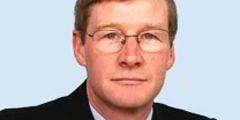
Although generally not endearing himself to the press during the trial, Popplewell did garner a degree of sympathy when he turned up at court sporting a neck brace after sustaining an apparently non-trial-related injury.
“I suggest that if your arguments are true and this was an arms length meeting, one of your main arguments would have been that you had him over a barrel.”
Popplewell tries to shaft Skarga on the axing of charters on ships which were instead put on the sales block. (7 December 2009)
“I would not be very surprised if others such as [Richard] Fulford-Smith were prepared to turn a blind eye to this golden egg.”
Broking bigwig Fulford got frequent mentions in the shipping trial of the century, like here from Popplewell on allegations of address commissions being paid to Clarksons broker Richard Gale for Russian ship orders. (23 March 2010)
('No coincidence' for Skarga.)
“Once incentivised, always incentivised. Once beholden, always beholden.”
Popplewell coined one of the memorable phrases of the lengthy trial when he alleged corrupt payments from Nikitin to Skarga. (22 March 2010)
(Skarga 'beholden' to Nikitin.)
“A laptop and a phone are not the sort of thing that cheers many people up.”
The Sovcomflot barrister tells Yuri ‘St Nicholas’ Nikitin that electronic goodies to “suicidal” Privalov were hardly going to “improve his mood a little”. (18 November 2009)

Nuts, and Berry: Steven Berry QC, barrister for Yuri Nikitin.
Without question the most charismatic of barristers on show at the High Holborn court, Nikitin’s man of law Steven Berry also frequently proved himself the most capable.
The well-groomed orator displayed a knack of keeping on Justice Smith’s good side and was not averse to throwing in some of the most colourful accusations at cross-examination time.
“Why is it that they have found nothing? There is the ‘Scarlet Pimpernel’ theory. Or there is the common sense theory: They haven’t found anything because there isn’t anything.”
It didn’t take Nikitin’s barrister Berry long to introduce the ‘Scarlet Pimpernel’ element into the equation as he made an opening address to Justice Smith. (2 October 2009)
“Our case is that this case is a politically motivated and dishonest vendetta.”
Berry assured us that we were to be treated to reams and reams of dishonesty during the trial¿from Sovcomflot, of course. (2 October 2009)
“Whereas the ‘knobs’ may be sufficient for the English law of dishonesty, they might not be enough for bribery.”
Berry, when Justice Smith referred to gifts or hospitality between Russian parties as “networking with knobs on” in late March (26 March 2010)
"In my submission, it is a house of cards. When the house of cards collapses one is left with only Mr Nikitin's evidence."
When all else around us has come tumbling down, at least we are left with Nikitin’s kernels of truth, Berry contended in his closing submission. (29 March 2010)
Dunning for the truth: Graham Dunning QC, barrister for Dmitry Skarga.

For a barrister representing arguable the case’s key defendant Dmitry Skarga, one may have expected to hear quite a bit more from Graham Dunning.
The QC was oftentimes harder to hear than his rival Popplewell but the pair displayed a curious sense of camaraderie despite sitting on opposite sides of the fence – honour amongst learned friends, then.
“I only want to say at this stage that a lot of incredible things have happened during the last 50 or so days and that is the most incredible of them.”
Dunning after it was revealed that Ince lawyer Anna Fomina, acting for Sovcomflot, was suddenly taken ill and rushed to hospital on a fact-finding mission in Moscow. (21 December 2009).
Graham Dunning QC, barrister for Skarga:“The investigation was illegal and shows the extreme lengths the claimants were prepared to go to find evidence against Skarga.”
Justice Andrew Smith:“Does the illegality matter?”
Dunning:“Yes, it does. You can get more information by acting illegally.”
Dunning assures the presiding High Court judge that illegal matters should be taken with a degree of seriousness. (25 March 2010)
(Private eye probe 'illegal'.)
Money talks: Igor Borisenko, former Sovcomflot finance chief.
Despite never really looking comfortable in the dock, Igor Borisenko was willing to make the wooden platform his home for longer than many of us would ourselves prefer.
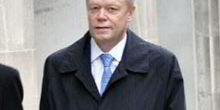
The former Sovcomflot finance chief generally gave considered answers to the barrage of questions thrown his way but towards the end wilted under the incessant cross-examination until admitting he was “sick and tired” of it all.
“It was not safe to keep that money in a bank. I kept it at home, in a drawer.”
Borisekno liked to keep dollar bills hidden around the house – like 250,000 of them in one go, for example. (21 October 2009)
“I cannot remember it now, for sure. Forgive me. [There have been] too many events and they are mixed in my head. It’s really a problem because sometime you can remember what happened a week ago, but seven years ago it’s very difficult.”
Borisenko’s memory temporarily deserted him when pressed by Justice Smith for answers on a large sale-and-leaseback transaction in the offing in 2002. (19 October 2009)
‘Tapir’ caper: Former Novoship president Tagir Izmaylov.
Tagir Izmaylov would always turn up for court on time...just about.
The fast-walking former president of Novoship made a habit of sitting through much of the trial despite appearing to have less English than some of his co-accused.
At times prickly under questioning, the silver-haired executive nick-named ‘Tapir’ by ex-colleagues was well capable of surviving any grilling he was subjected to and sometimes employed irony to good effect.
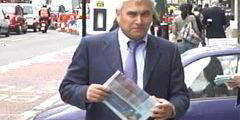
“We would have spent a lot of money fighting with TradeWinds, so we decided not to.”
Former Novoship president Tagir Izmaylov revealed he decided to give us hacks a break when quizzed on an article on the company fixing ships for low rates in 2003. (16 December 2009)
“I hope that I will win this case.”
Izmaylov was banking on victory to repay around $13m of ‘loans’ from Nikitin. (14 December 2009)
Prison diaries: Yuri Privalov, former boss of Fiona Maritime.
Yuri Privalov has been a naughty boy in the past, and he wasn’t averse to admitting as much.
The former head of Sovcomflot’s London subsidiary, Fiona Maritime, gave his evidence via video link from Moscow where he is hoping his cooperation might earn him an easier ride.
Berry:“You were a thief.”
Yuri Privalov:“Strong words, but yes I agree so.”
Hmmm, you can’t say it straighter than that - touché to the Russian! (2 November 2009)
“Maybe Caviar was not the right name because it was too exotic.”
Privalov on the company set up to handle commissions from Nikitin¿yeah, possibly not the wisest of choices there, Yuri. (6 November 2009)
“He is a better drinker than me.”
Privalov on a letter written by Skarga after a boozy night out in London, sent to former Sovcomflot chairman Igor Shuvalov complaining about alleged heavy-handedness from Frank. (2 November 2009)
“I’m here to tell the truth whether plausible or not and whether you like it or not I hope to tell the truth.”
Fruadster Privalov is all about the truth these days. (29 October 2009)
Telling tales: Steady stream of witnesses added to trial’s colour.
Of course the trial wasn’t all about Russians, be they forthcoming or noticeably elusive. A whole host of other industry personnel joined in over the six or so months to make for some juicy jurisprudence.
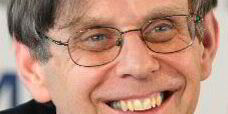
“Paying too much attention to economist’s forecasts can be a sign of mental instability. If you feel this coming on during the following presentation, please consult a doctor as soon as possible. We cannot be liable! However if you find yourself thinking about sex that is perfectly normal but we suggest you find an industry that has more women in it.”
A disclaimer on a 2004 state of the market presentation by Clarksons’ research chief, Martin Stopford, brought some chuckles to the court room when submitted in evidence. (2 February 2010)
“As a broker, sometimes you present things in a way that makes them more attractive to their audience. I am a broker, I ‘broke’!”
Former Clarkson’s newbuilding broker Nick Wood on deals between Sovcomflot and HHI also involving Richard Gale. (18 December 2009)
“As a shipbroker myself, even if I am from a backwater like New York, I would not have been able to compete for this business. This was so far removed from market practice it is incomprehensible.”
Felix Pierot, of New York-based ‘undercard’ Jacq Pierot Jr & Sons, when quizzed by Berry. (17 February 2010)
“We have a nice fraternity in the shipping business where you don’t get paid for doing people favours. When someone moves house and the new neighbours take them a welcome basket, you don’t expect them to come and do your laundry the next day.”
Pierot tells Berry that broking is not all about handshakes and backrubs; there’s actually some hard work done along the way too, you know. (17 February 2010)

“I think you are knocking on an open door, as we say in Russian.”
Russian law expert Professor Alexander Petrovic Sergeev is slightly unhinged when questioned by Dunning on Russian civil law. (23 February 2010)
“When the market rate is $27,000 per day and we fix at $19,000 per day it stands out like a sore thumb. This is why I made the handwritten comment.”
Andrei Novikov, former deputy manager of fleet operations at Sovcomflot, on his warning over ships fixed to Nikitin at bargain basement rates. (28 October 2009)
